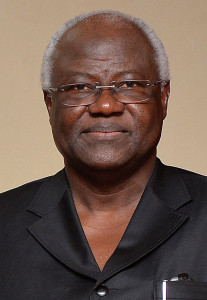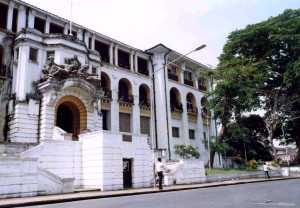Political Tensions in Sierra Leone After Vice-President Is Sacked
Sierra Leone’s political situation was thrown into flux last week when President Ernest Bai Koroma sacked his Vice President, Samuel Sam-Sumana after Sam-Sumana sought asylum at the American Embassy. Sam-Sumana was reportedly kicked out of the membership of the ruling All People’s Congress (APC) at the beginning of March when he was accused of forming his own breakaway party and inciting violence in his home region of Kono. The APC also claimed that he had falsified his religious affiliation and educational background. According to Sam-Sumana’s associates, the Vice President fled after receiving information that the President’s troops were coming to arrest him.

The drama has since escalated: last Friday, a meeting of lawyers at Sierra Leone’s bar association was violently broken up by the police after it was leaked that the lawyers would determine the legality of President Koroma’s decision. The main opposition party in Parliament, the Sierra Leone People’s Party, announced that it would stage protests next Monday to challenge Koroma’s ruling. The party is also considering the impeachment of the president.
Part of this chaos stems from the debated constitutionality of the measure. Koroma argues that “Sam-Sumana is no longer a member of a political party in Sierra Leone and therefore does not have the continuous requirement to hold office as vice president of the Republic of Sierra Leone." What does Sierra Leone’s political framework, which was approved in 1991, say about this legal argument? According to Section 54, the conditions under which the Vice President can be removed from office mirror the conditions for the President’s removal. These conditions are detailed in Section 51, which states the President or Vice-President can be investigated for misconduct if a two-thirds majority votes on a motion to open probing. Following a tribunal that examines the allegations, if the President or VP is found guilty of misconduct, he can be forced to step down by a vote of Parliament. The section never mentions political affiliation as a factor for Vice Presidency.
Kandeh Yumkella, a renowned and experienced expert in law, argues that these conditions were carefully laid out in the constitution to prevent the President or Vice President from being arbitrarily deposed from office - the exact manner by which Sam-Sumana was sacked by Koroma last week.
Koroma’s motivation may have been more political than constitutional. According to the news agency Deutsche Welle, Koroma may have been wary of Sam-Sumana’s powerful position in the APC and did not wish to let the Vice President succeed him once his constitutional term concludes in 2017.
Whatever the rationale may be, it could not have come at a worse time. The impoverished country is still struggling to recover from the ongoing Ebola outbreak, which has claimed the lives of 3,700 people thus far. According to Doctors Without Borders (MSF), the case count has not declined since January. The medical charity released a report this week criticizing groups like the World Health Organization and the governments of Sierra Leone and Liberia for not doing enough to stop the outbreak. Without resolving the ongoing drama regarding Koroma and Sam-Sumana, Sierra Leone’s political legitimacy may further be called into question.

